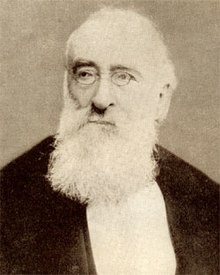Agostino Depretis
| Agostino Depretis | |
|---|---|
 |
|
| 9th Prime Minister of Italy | |
|
In office 29 May 1881 – 29 July 1887 |
|
| Monarch | Umberto I |
| Preceded by | Benedetto Cairoli |
| Succeeded by | Francesco Crispi |
|
In office 18 December 1878 – 14 July 1879 |
|
| Monarch | Umberto I |
| Preceded by | Benedetto Cairoli |
| Succeeded by | Benedetto Cairoli |
|
In office 25 March 1876 – 24 March 1878 |
|
| Monarch |
Victor Emmanuel II Umberto I |
| Preceded by | Marco Minghetti |
| Succeeded by | Benedetto Cairoli |
| Personal details | |
| Born |
January 31, 1813 Stradella |
| Died | July 29, 1887 (aged 74) Stradella |
| Political party | Historical Left |
Agostino Depretis (31 January 1813 – 29 July 1887) was an Italian statesman. He was the Prime Minister of Italy for several times between 1876 and 1887.
Depretis was born at Bressana Bottarone, near Stradella, now in the province of Pavia (Lombardy). From early manhood he was a disciple of Giuseppe Mazzini and affiliated with the La Giovine Italia. He took an active part in the Mazzinian conspiracies and was nearly captured by the Austrians while smuggling arms into Milan. Elected deputy in 1848, he joined the Left and founded the journal Il Diritto, but held no official position until appointed governor of Brescia in 1859.
In 1860 he went to Sicily on a mission to reconcile the policy of Cavour (who desired the immediate incorporation of the island in the kingdom of Italy) with that of Giuseppe Garibaldi, who wished to postpone the Sicilian plebiscite until after the liberation of Naples and Rome. Though appointed pro-dictator of Sicily by Garibaldi, during the dictatorial government, he failed in his attempt.
Accepting the portfolio of public works in Urbano Rattazzi's cabinet, in 1862, he served as intermediary in arranging with Garibaldi the expedition that ended disastrously at Aspromonte. Four years later, on the outbreak of war against Austria, he entered the Ricasoli cabinet as minister of navy, and there he insisted with admiral Carlo Persano on the attack against the island of Lissa—as a revenge for the Italian defeat of Custoza. But he also refused to give to admiral Persano detailed orders about the expedition in the Adriatic Sea against the fleet led by Wilhelm von Tegetthoff. His apologists contend, however, that, as an inexperienced civilian, he could not have made sudden changes in naval arrangements without disorganizing the fleet, and that in view of the impending hostilities he was obliged to accept the dispositions of his predecessors.
...
Wikipedia
